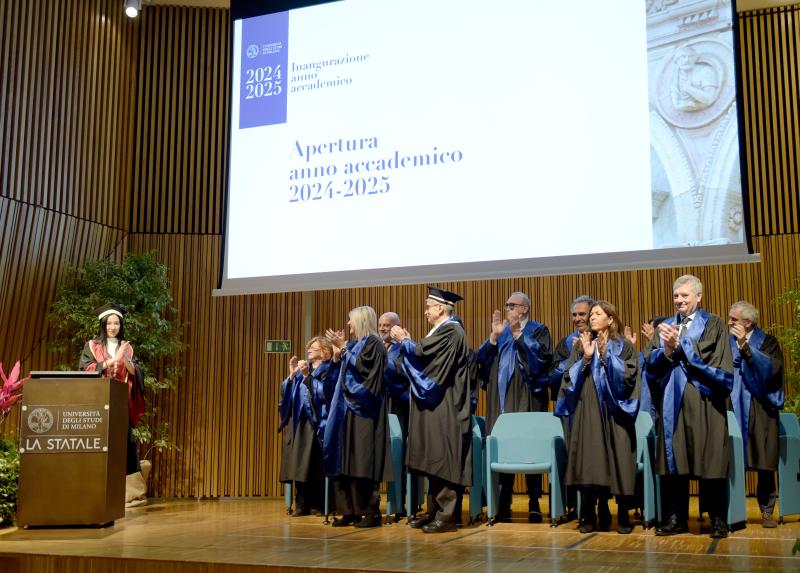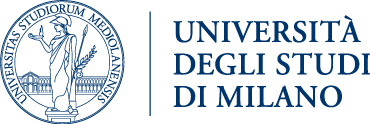
La rettrice Marina Brambilla e la governance all'inaugurazione dell'anno accademico 2024-2025
Technological, geopolitical and social changes which, to various extents, are sweeping Europe and the world, provided the backdrop for the speech delivered by Rector Marina Brambilla at the inauguration ceremony of the academic year 2024/2025. In her words, the University of Milan is called upon to rethink the civic and leadership role of universities with courage and curiosity, providing the tools to drive digital and ecological transitions from an intergenerational perspective, while remaining a truly multidisciplinary public university, keen on investing in upskilling and reskilling strategies.
Research infrastructures, urban regeneration projects (the MIND campus, Città Studi), courses to master the use of AI and investments on global health: these are the tools that the Rector intends to use to navigate current transformations and create public value for future generations. The University of Milan looks to 2030 by combining traditional European values with scientific and technological innovation, placing "the individual and individual dignity" at the heart of its actions.
These challenges are addressed in the new Strategic Plan 2025-2030, which outlines the future of the University of Milan. Following its recent approval by the governing bodies, the document was presented during the inauguration ceremony and repeatedly mentioned by Rector Marina Brambilla during her speech.
The inauguration ceremony took place in a packed Great Hall, with the Rector's speech preceded by the opening remarks of Milan's Mayor Giuseppe Sala, Undersecretary of State to the Presidency of the Council of Ministers Alessandro Morelli, and President of the Lombardy Region Attilio Fontana. Director General Angelo Casertano and President of the Student Council Giacomo Pangrazzi also took the stage, followed by keynote speaker Paola Bovolenta, Director of the Centro de Biología Molecular Severo Ochoa (CSIC-UAM) and President-elect of the Federation of European Neuroscience Societies (FENS).
The transformation into a multi-campus higher education institution is placing the University of Milan at the forefront of governing complexity, starting from the challenging project of the new campus in MIND (Milan Innovation District).
In the years to come, the implementation of an AI development plan will be strategically important for our University. The AI development plan will include: guidelines on the applications of AI to research and teaching; an AI Literacy course open to all students of the University of Milan, structured in modules and providing general as well as domain-specific training; the creation of the StAI Academy, a coordinating body promoting initiatives related to AI and data science in collaboration with local institutions and companies.
In her speech, Rector Brambilla reflected on the meaning of public university and the importance for students to experience campus life: "We have chosen to strengthen our commitment to ensuring the right to higher education, by providing students not only with economic support, but also with a quality experience and an inclusive environment", with a focus on their "psychological well-being."
Innovative teaching is another primary goal of the Strategic Plan. Online and blended learning should no longer be seen as a taboo, but rather as a support to traditional learning or, in the words of the Rector, as "an extraordinary opportunity, for those who never considered studying at university, to access high-quality study programmes with a great tradition and reputation. This is fundamental in a country where university studies risk becoming, once again, a privilege of the elite". Nevertheless, as the Rector pointed out, "Even with the introduction of innovative modes of teaching, our educational offer will never be driven by business interests, but rather inspired by the most noble cultural and scientific values."
Several times in her speech, Rector Brambilla highlighted the importance of enhancing academic research and its international and European dimension. Notably, she recalled that the University of Milan has won 63 ERC grants since 2010, and is the sole Italian member of LERU, the League of European Research Universities. "Europe's commitment to research represents not only an investment in the future of humanity, but also an ethical and strategic choice to address complex problems", she added. "International collaboration between research teams from different countries and disciplines represents an essential added value."
Paola Bovolenta also highlighted that "by fostering curiosity-driven research, we enable ourselves to look well ahead and set the ground to solve not only current problems but also those that we do not even know will exist [...]. It is through this lens that we need to value research for the sake of knowing, discovering and understanding, the kind of research that dares asking the most challenging questions, those that can lead to transformative changes, those that nowadays only a few funding agencies unfortunately dare to support."
As a matter of fact, the notion of freedom of research is reflected in the goals of the Strategic Plan, which states that research should have no limits "other than compliance with ethical values". Rector Brambilla also stressed the University's commitment to technology transfer, mentioning a recent study conducted by the European Patent Office (EPO), where the University of Milan ranked second among Italian universities for the number of patent applications submitted between 2000 and 2020 (682).
Investments in research infrastructures will also play a key role in the enhancement of research. This is reflected in the project of the new MIND campus, which is designed to accommodate 23,000 people over 200,000 square meters. Of these, 62,000 square meters will host laboratories, including a 15,000 square meters scientific platform with state-of-the-art technological equipment, which will be made available to research teams from all over the world.
The Strategic Plan also includes actions for the improvement of public health, an area where the Faculty of Medicine of our University is already providing a strong and valuable contribution. "In a time when our healthcare system is under constant pressure, we have a dual mission: to train highly-skilled professionals who are well aware of their social role, and to make sure that our research contributes to the improvement of healthcare policies, access to healthcare and public health", said Rector Brambilla. Special emphasis is placed on the University's commitment to scientific and social advocacy, with the development of campaigns addressed to both students and citizens and aimed at promoting the impact of research and the protection of health.
The final part of the Rector's speech underlined the civic role of the University stressing that the years spent in education play an invaluable part in the life journey of any individual, because "education as a whole, of children, youths and adults, is a collective adventure, and the most important one." The Rector concluded: "In a world that is deeply affected by the crisis of political participation and representation, and by the negative effects of virtual socialisation, universities remain an essential point of reference for the construction of citizenship. […]. Universities, and the University of Milan in particular, foster a civic consciousness through critical thinking, mutual respect and thoughtful decision-making. Along with schools, "universities are the place where we must build a society of respect."
Potrebbero interessarti anche
